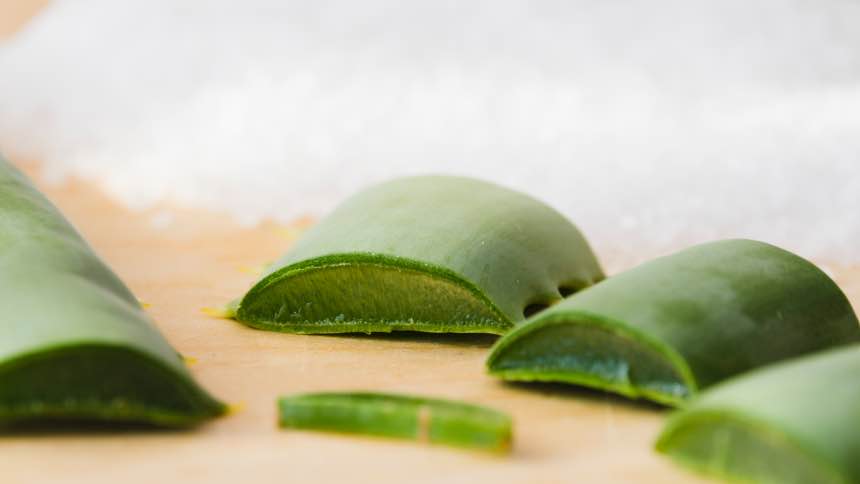Aloe vera is called the “plant of immortality” for a reason. That’s because it’s been used for centuries for a variety of health benefits, and still is to this day. If you’re looking to learn a little about the health benefits of aloe vera then read on.
Note that before we jump in we have to be upfront, we are garden lovers, not medical professionals. You should always talk with your doctor before implementing any sort of foreign objects into your healthcare routines. In other words, we are not doctors and none of this should be taken as medical advice.
The Benefits of Aloe Vera
Used for centuries, this spiky succulent has a wide range of benefits for our bodies. Even now, scientists are still studying aloe vera for new and potential uses. Here are 7 of our favorite benefits that aloe brings to those that decide to grow it.
Skincare
Aloe vera contains compounds called polysaccharides which have anti-inflammatory properties. When you apply aloe vera gel to sunburned skin, these polysaccharides can help reduce redness and swelling. This is the reason that aloe is so often recommended as a sunburn treatment. The moisturizing properties in aloe can help sunburned skin from becoming flaky and peeling.
Additionally, the antimicrobial properties of aloe vera make it effective against a wide range of bacteria, fungi, and viruses. This is why aloe vera is often used to treat minor burns, cuts, and scrapes.
The active compounds in aloe vera gel, including polysaccharides and glycoproteins, can help to stimulate the growth of new skin cells and promote the production of collagen, a protein that is essential for skin health. Collagen is responsible for giving our skin its strength and elasticity.
As we age, our bodies produce less collagen. This can lead to wrinkles and sagging skin. Given that aloe vera contains compounds that can help stimulate skin collagen production, we may experience improved skin elasticity and reduced appearance of fine lines and wrinkles.
Finally, aloe vera is a popular natural remedy for treating acne. The gel from the plant contains salicylic acid. It is commonly used in many acne products due to its ability to exfoliate the skin and unclog skin pores. Salicylic acid also possesses anti-inflammatory properties that can help reduce the redness and swelling associated with acne.
It should be noted that while aloe vera can be a great addition to your skincare routine, it’s not a magic cure for aging. Other factors, such as sun exposure, diet, and lifestyle habits, can also affect the health and appearance of your skin.
Digestive Aid
Aloe is also a well-known digestive aid. Made into juice, it can aid in digestion and alleviate digestive problems like constipation and bloating. The juice contains compounds called anthraquinones. These have a laxative effect and can help keep you regular. Additionally, aloe vera juice contains enzymes that can break down food and improve nutrient absorption in the body.
Hair Care
Aloe vera is also used as a natural hair product. The gel from the aloe vera plant is rich in vitamins and minerals that can help moisturize and nourish dry or damaged hair. It can also help to reduce dandruff and promote healthy hair growth. Overall, adding aloe to your hair care routine can help keep your scalp healthy and nourished.
Oral Health
Aloe’s anti-inflammatory properties can also help with oral health. Mouth ulcers and gum inflammation are two areas where aloe can help. By using aloe, you can reduce the symptoms of these issues.
It also has antibacterial properties that can help prevent cavities and keep your mouth clean. That said, it’s no substitute for proper oral care like brushing, flossing, and regular dentist visits.
Immune System Booster
Aloe vera contains various nutrients, such as vitamins A, C, and E, which are known to support immune function. In addition, aloe vera contains polysaccharides, which have been shown to enhance the immune system’s response to infection.
One of the ways aloe vera helps boost the immune system is by increasing the production of white blood cells, which play a crucial role in fighting off infections and diseases. Aloe vera also contains antioxidants. These are compounds that protect our cells from damage caused by harmful molecules called free radicals.
When free radicals accumulate in the body, they can cause oxidative stress. This can lead to a weakened immune system and a higher risk of developing chronic diseases. Aloe can help combat this, and has been shown to help boost overall immune system functions.
Heartburn Relief
Aloe is also commonly used to help reduce heartburn. It works to do this in a couple of ways.
First, it has a soothing and cooling effect on the lining of the esophagus and stomach. This helps reduce the burning sensation commonly associated with heartburn.
Second, aloe vera contains compounds that can help neutralize stomach acid. Stomach acid is the root cause of heartburn, so aloe works to treat the issue at the source. Aloe can help reduce the acidity of your stomach acid which lessens symptoms.
Finally, we return to aloe’s anti-inflammatory properties. These properties can help reduce inflammation in the digestive system which can contribute to heartburn symptoms.
Anti-cancer Potential
Some studies have suggested that aloe vera may have anti-cancer effects due to its ability to inhibit the growth of cancer cells and promote apoptosis, or programmed cell death. Aloe vera contains compounds, such as aloin, aloe-emodin, and acemannan, that have been shown to possess anti-cancer properties in laboratory studies.
While aloe vera has been studied for its potential anti-cancer properties, more research is needed to fully understand how it works in fighting cancer.
In addition to its potential direct anti-cancer effects, aloe vera may have indirect effects on cancer prevention and treatment. For example, aloe vera has been shown to have anti-inflammatory effects, and chronic inflammation is a known risk factor for cancer development.
Aloe vera may also help boost the immune system, which can play a role in cancer prevention and treatment. As noted above, these claims are still under review and the subject of future studies, but the existing evidence is certainly promising.
How to Grow Aloe Vera
With all the benefits it’s no wonder that aloe is such a popular houseplant. If you’re looking to grow it yourself then here’s a quick getting-started guide. For more information, check out our full guide to growing aloe.
First off, you’ll need to get an aloe plant. Aloe is very popular, so it’s easy to find at most nurseries or big box stores. Even during the-off season, it’s not uncommon to find it for sale. You can also ask a friend for a “pup” which is the offshoot of an existing, mature plant. You can plant your “pup” much the same way as a traditional plant.
Next, select a pot that is slightly larger than the plant’s root system. Clay pots work well, but any material will work as long as it has drainage holes. Fill the pot with well-draining soil, cacti or succulent mix works best. You can also add some perlite or sand to improve drainage, but this isn’t strictly necessary for most cases.
Next, place the aloe plant in the pot and gently pack the soil around the roots. Make sure the plant is stable and upright and doesn’t fall over easily as this will harm the plant.
Water the plant thoroughly immediately after planting. Then, allow the soil to dry out completely between waterings. Aloe is a succulent, so can go several weeks between waterings depending on the environment. It’s good to get into the habit of checking the soil every few days and water when it’s dry.
After planting, you’ll want to place your aloe in the optimal location for growth. Aloe likes bright, but indirect sunlight for several hours per day. An eastern-facing window is a great place for them or a few feet back from a southerly facing one.
Parting Thoughts
Aloe vera is a versatile plant that has numerous health and beauty benefits. Its natural compounds and soothing properties can help with many health issues, and it has been used for such for centuries. By incorporating aloe vera into your daily routine, you can experience these benefits and promote your overall well-being.
However, if you have any underlying health conditions or are taking medications, it’s always best to consult with your healthcare provider before adding aloe vera juice to your diet. They can help you determine if it’s safe and appropriate for you based on your individual health needs. As we mentioned above, we are not medical doctors and can’t make any claims to that effect. You should always consult your doctor before adding new items to your healthcare routine.







